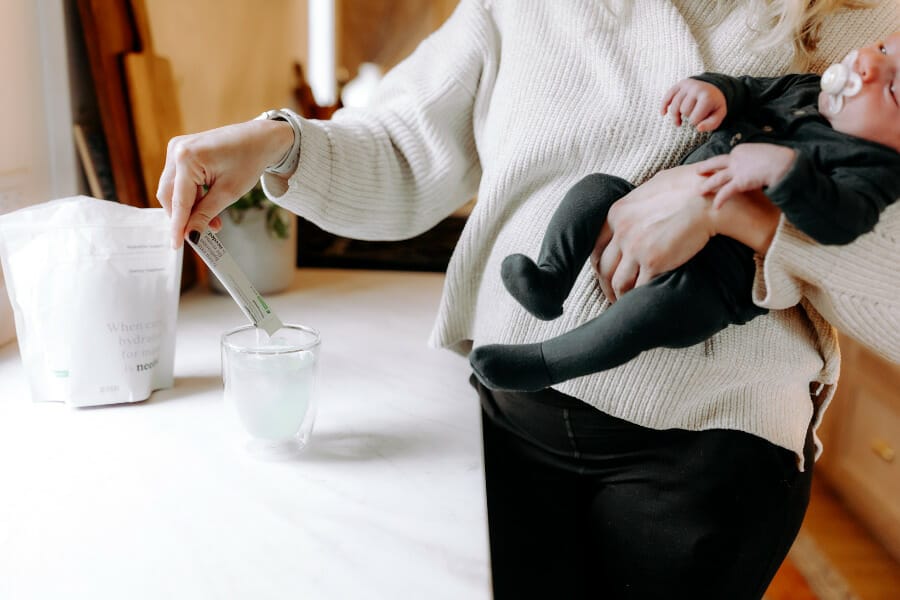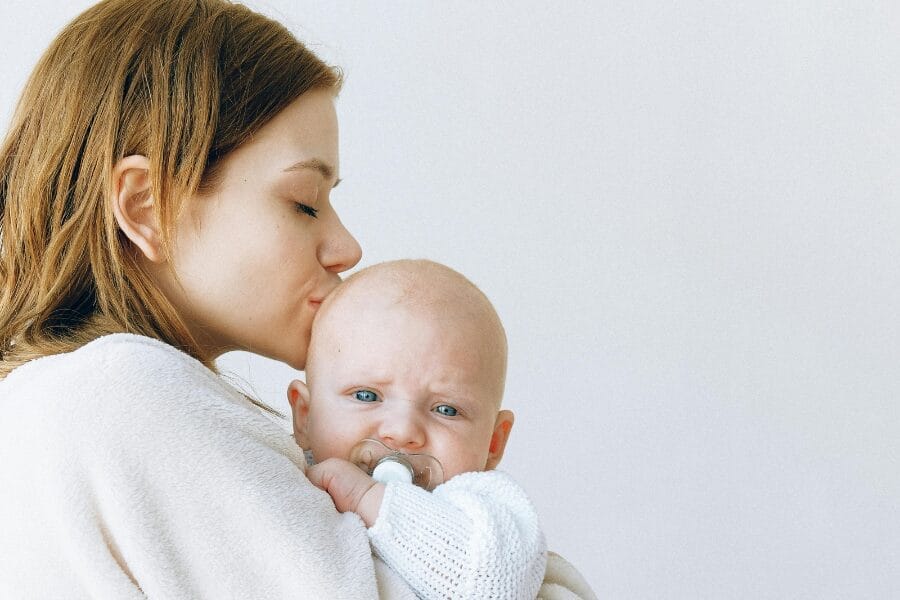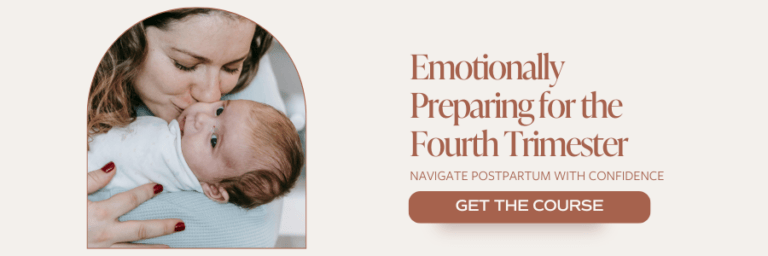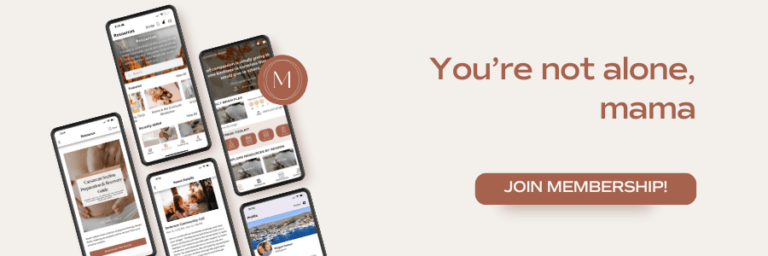This post may contain affiliate links from affiliate programs we participate in. If you make a purchase through these links, The Matrescence may earn a small commission at no additional cost to you. We only recommend products and services that align with our mission to support mothers and that we genuinely believe in. Your purchases through these links help support our work and allow us to continue creating valuable resources for moms like you. Thank you for your support!
Postpartum Self-care: Self-care Tips for New Moms
Becoming a mother (your matrescence) is an extraordinary, life-altering experience that brings with it a multitude of joys, challenges, and a sleep-deprived whirlwind of changes. Postpartum self-care is much more than a buzzword – it’s a lifeline for new mothers navigating the complexities of modern motherhood. With the weight of nurturing a new baby added to the mix, it’s no surprise that self-care often takes a backseat.
In this blog post, we’ll explore why postpartum self-care is crucial for new moms and provide actionable tips to not only prioritize your well-being but also to indicate where to seek help and how to maintain mental and physical health to help you feel more confident navigating this formative phase of motherhood.
What is Self-Care to You?
It’s vital to remember that self-care isn’t one-size-fits-all. Some might find self-care support in the form of a five-minute breathing exercise to restore calm, for others, it could be a solo walk in the neighborhood. Give yourself permission to look inward and reflect on what tools help you to recharge. Identifying what self-care activities resonate with you is the first step to establishing a routine that’s as unique as you are. Take some time to think about activities that rejuvenate you and make you feel like ‘you.’ Whether it’s support groups and social needs or physical exercises, like a light jog, incorporating these into your daily routine can significantly impact your postpartum experience and mental wellbeing.
Understanding your unique self-care needs
- Indulge in a hobby or activity you love that’s unrelated to motherhood or childcare, even if it’s for minutes a day for now. It’s important to keep these activities as part of your routine. This can be a simple 5 minute meditation from The Matrescence® App, or reading a chapter of your favorite book during nap time.
- Consider your past routines. Before motherhood, what did you do for yourself that made you feel joyous and alive? A pedicure with your bestie? Quiet time outdoors? Nutritious meals? It’s so easy to focus on baby and forget to take care of yourself. Taking time to identify what your body needs to stay grounded in your new role is important for new moms to reflect on to build a toolkit that allows you to incorporate these things and help you recover, mind, and body.
- Reflect on self-care activities that you’ve neglected since giving birth to your little one and make a conscious effort to reintegrate them into your day. This can be goals of getting back to the basics, such as: staying hydrated, enjoying a warm cup of coffee, or schedule time for physical and mental breaks throughout the day to remind you to soothe yourself too.

How to Make Time For Self-Care With a Newborn
Implementing Bite-Sized Self-Care
- Utilize your baby’s nap times to engage in brief self-care activities like stretching, meditating, or even a quick shower!
- Accept help from loved ones. When someone offers to watch the baby or help with baby needs, use this time for self-care and relaxation rather than catching up on chores. (The to-do list will always be there, so fixating on completing it can make it harder to relax)
- Invest in self-care items to help you relax such as a breastfeeding support, or noise-canceling headphones for a walking meditation from our team of experts at The Matrescence.
Giving Yourself Mental Space
Mental Health Tips for New Moms
The transition to motherhood is fraught with hormonal shifts and emotional challenges such as anxiety, depression, and even outbursts of anger or rage. Prioritize your mental health like you would your baby’s physical health.

Establishing a Daily Mental Health Routine
- Integrate a walk into your daily routine, even if it’s just for a few minutes. Fresh air and light exercise do wonders for your mood. Or better yet, check out our evidence-based mindfulness resources at The Matrescence, including walking meditations!
- Utilize mental health resources such as podcasts, online communities, or mental health professionals who specialize in postpartum care. Our online resource library at The Matrescence has resources on various topics than impact your mental health in parenthood, including pelvic floor health, education on your mood or anxiety, tips to help differentiate baby blues from postpartum depression, and sleep hygiene to name a few!
- Carve out time to regularly assess your feelings and emotional well-being. If you notice persistent feelings of sadness or anxiety, don’t hesitate to seek professional help. Pregnancy and postpartum is a vulnerable time for mental health and checking in with yourself can help you differentiate if what you’re feeling warrants clinical support from a psychiatrist of other provider or if what you’re experiencing is completely normal and can be cared for at home. Seeking help and support in the postpartum period is a sign of strength and insight and The Matrescence® was created to be a part of your postpartum support to help navigate the complexities of pregnancy and childbirth and the ambivalent emotions that are so common.
Finding Support
Building Your Support System and creating your village
- Join mother’s groups or online forums where you can connect with other new moms who are going through similar experiences. Our peer support groups inside The Matrescence App are a great place to start! Join groups based on your season of life and join a safe, private space to connect with women walking alongside you.
- Make time for family and friends. If surrounded by the right people, social support can help you to relax and unwind. Looking for mom friends in your area? We know it can feel hard. Check out our podcast with Shanna from ‘@wellnessforthewin’ discussing How to Make Mom Friends. Seeking and maintaining these relationships can provide invaluable emotional support.
- Consider professional support groups for new moms. These groups provide a platform to share experiences and receive guidance from experts. If you are looking for a specific live support group, PSI offers free, confidential support groups with various topics, from navigating postpartum mood and anxiety disorders, to moms with NICU experience.

Growth Without Burning Out
The desire to be the perfect mother often leads new moms to overextend themselves. Growth should be celebrated, but not at the expense of your well-being.
- Set realistic goals for yourself. Whether it’s breastfeeding, going back to work, or fitness, recognize that you’re doing the best you can and setting goals that feel attainable will help you to take a step at a time instead of feeling like you have to scale a mountain to feel accomplished.
- Embrace the concept of ‘good enough.’ It’s okay to order takeout or forgo cleaning the house in favor of a nap with your baby—they won’t remember a messy house, but they’ll benefit from a rested, happy mom.
- Also take time to celebrate small victories. Motherhood has plenty of challenges, but acknowledging and celebrating your successes, no matter how small, can foster a positive mindset.
Tips to sneak in Self-Improvement Time
Continuing your self-improvement journey can be daunting with a newborn. However, finding time—even in short bursts—can replenish your spirit and energy.
The Matrescence app was made with the busy mama in mind! Here are a few ways you can utilize the resources in the app for minutes a day:
- Utilize the mindfulness resource library to complete a short meditation— whether it is before bed with one of our mama and me sleep meditations or it is a walking meditation that you can do with a fussy baby strapped into a carrier, there is a short, attainable activity for everyone in there to bring your nervous system back to neutral.
- Incorporate short self-improvement activities into your daily routine, such as our gratitude prompts or library of affirmations, these activities will allow you to bolster your mental and emotional well-being with small habit shifts and tools right at your fingertips.
- Don’t be too hard on yourself. Self-improvement does not equate to perfection. Give yourself grace and take it one small step at a time. Take the first step today by checking out the free version of our app and completing one mindful activity. Tag us on Instagram showing how you’re prioritizing self-care with our tools!
Nourish Your Body
Postpartum nutrition essentials
- Batch cook and freeze meals before your due date to have healthy, homemade options available when time is scarce. We love making protein balls for our new mama friends for a quick, nutritious and high-protein MOTN snack.
- Stay hydrated! Set a goal for how much water you want to drink each day and track your intake.
- Have healthy snacks on hand for those moments when you need a quick bite. Nuts, fruit, and yogurt are excellent options. Need help getting started? Check out our shopping list for good mood foods.
- Consider supplements! Always consult your healthcare professional before taking new supplements, but a few supplements and nutrients we focus on for whole body health to educate yourself on if interested in focusing on nutrition are protein, omega-3’s and electrolytes.

Mental Wellbeing Tips for Mamas
Wellness, especially when it comes to women’s health, is about more than nutrition and exercise; it encompasses all facets of health, including emotional and spiritual well-being.
- Build a bedtime routine for you and your baby. It’s crucial to establish good sleep habits early on so that you both get plenty of rest and set yourself up for success beyond the first six weeks postpartum. Just like you create a sleep routine for baby, mama needs one too!
- Consider other professionals who exist to serve women to better understand various struggles that impact your emotional health. This can be looking into lactation support or a breastfeeding helpline, exploring incision healing and core support with a pelvic floor physical therapist, or checking in with a therapist about mood swings since mood disorders during pregnancy and within the first year postpartum are very common!
- Engage in activities or practices that bring you joy and relaxation, whether it’s listening to your favorite podcast episode or finding physical activity and movement that feels good, it’s important to identify these activities and make space for them.
How to Take Care of Yourself After Giving Birth When…
You Only Have 5 Minutes
You're trying to decipher the baby blues from postpartum depression
You want to breastfeed, but it's not going as planned
If you want to keep trying, here are some resources that you might find helpful:
- La Leche League, Lactation support through your insurance, or follow @karrie_locher on instagram as a postpartum RN and BFC.
If you don’t want to keep trying:
- DO NOT BE HARD ON YOURSELF. Moms experience enough guilt around decisions and there are a million ways to be a great mother, NO way to a perfect one. If breastfeeding is not bringing you joy or you have a reason you would like to be done, YOU are the best one to make that decision. Not the internet, not your mother-in-law who breastfed six children, but YOU mama. If you’re going the formula route, we recommend Bobbie’s organic infant formula. You can use code THEMATRESCENCE for a discount.

You’ve Been Diagnosed With Postpartum Depression
You’re a Single Mom
You’ve Experienced a Traumatic Birth
If something felt out of control and was “too much fast, too fast, too soon” your trauma is valid. Engage in trauma-informed care, which may include therapy, support groups, and seeking out practitioners who specialize in postpartum trauma and recovery. The Matrescence App includes several resources related to birth trauma including a “honor my birth story” template.
You're Doing a Great job, mama!









